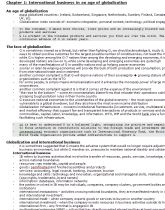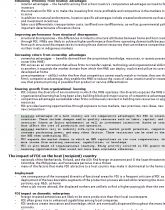Prednášky: International business
Skryť detaily | Obľúbený- Kvalita:87,1 %
- Typ:Prednášky
- Univerzita:Ekonomická univerzita v Bratislave
- Fakulta:Obchodná fakulta
- Kategória:Ekonomika
- Podkategória:Svetová ekonomika
- Predmet:International business
- Autor:kikita
- Dokumentácia:Stiahni
- Ročník:2. ročník
- Rozsah A4:26 strán
- Zobrazené:1 035 x
- Stiahnuté:3 x
- Veľkosť:0,3 MB
- Formát a prípona:MS Office Word (.doc)
- Jazyk:anglický
- ID projektu:10154
- Posledna úprava:15.10.2018
The face of globalization
- G is sometimes viewed as a threat, but rather than fighting G, we should acknowledge it, study it, and seek the best ways to obtain positive outcomes for the largest possible number of constituencies, not least the most vulnerable
- while G is higher among the G-7 nations than among the developing and emerging economies, it is clear that some developed nations are low on G, while some developing and emerging economies are quite high
- many of the manifestations of G in wealthy nations end up helping poorer economies
- sooner or later developing economies will provide the bulk of both production and consumption, profiting even more from international trade and investment
- another common complaint is that G will deprive nations of their sovereignty growing stature of international organizations such as the WTO
- for some people, G simply means Americanization and it enhances the monopoly power of large multinational corporations
- another common complaint against G is that it comes at the expense of the environment
- “the race to the bottom” - some environmentalists blame firms that relocate their operations solely for reasons of escaping tough pollution rules in their home country
- G exposes national economies to the uncertainties of the global economy - the most open economies are the most vulnerable to a global slowdown, but they also have the most even income distribution
- Globalization infrastructure - concerns institutional frameworks (investment, service, multilateral agreements in trade) and market efficiency that support fair and transparent transactions of products or services and streamline flows of commodities, capital, labor, knowledge, and information.
WTO, IMF and the World bank play a fundamental role in facilitating such infrastructure.
- G is sometimes viewed as a threat, but rather than fighting G, we should acknowledge it, study it, and seek the best ways to obtain positive outcomes for the largest possible number of constituencies, not least the most vulnerable
- while G is higher among the G-7 nations than among the developing and emerging economies, it is clear that some developed nations are low on G, while some developing and emerging economies are quite high
- many of the manifestations of G in wealthy nations end up helping poorer economies
- sooner or later developing economies will provide the bulk of both production and consumption, profiting even more from international trade and investment
- another common complaint is that G will deprive nations of their sovereignty growing stature of international organizations such as the WTO
- for some people, G simply means Americanization and it enhances the monopoly power of large multinational corporations
- another common complaint against G is that it comes at the expense of the environment
- “the race to the bottom” - some environmentalists blame firms that relocate their operations solely for reasons of escaping tough pollution rules in their home country
- G exposes national economies to the uncertainties of the global economy - the most open economies are the most vulnerable to a global slowdown, but they also have the most even income distribution
- Globalization infrastructure - concerns institutional frameworks (investment, service, multilateral agreements in trade) and market efficiency that support fair and transparent transactions of products or services and streamline flows of commodities, capital, labor, knowledge, and information.
WTO, IMF and the World bank play a fundamental role in facilitating such infrastructure.


